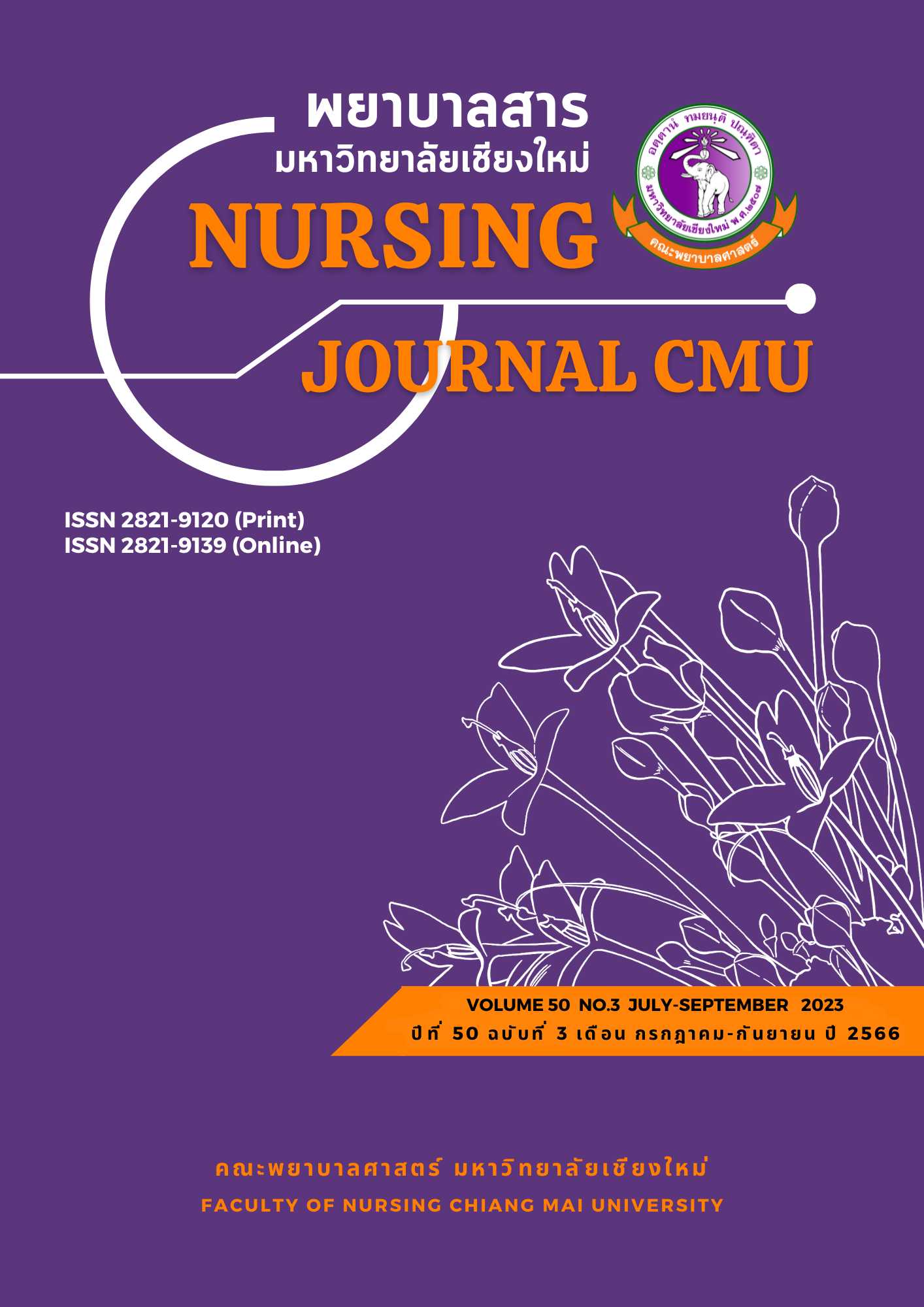การพัฒนารูปแบบการเสริมสร้างพลังอำนาจแก่ผู้สูงอายุและผู้เกี่ยวข้อง เพื่อส่งเสริมการเข้าเรียนในโรงเรียนผู้สูงอายุเขตสุขภาพที่ 5
คำสำคัญ:
การเสริมพลังอำนาจ, โรงเรียนผู้สูงอายุ, ผู้สูงอายุบทคัดย่อ
รัฐบาลส่งเสริมการพัฒนาโรงเรียนผู้สูงอายุ เพื่อปรับปรุงคุณภาพชีวิตของผู้สูงอายุ การวิจัยและพัฒนาครั้งนี้ เพื่อศึกษาสถานการณ์การดำเนินงานของโรงเรียนผู้สูงอายุ ศึกษาบทบาทและการมีส่วนร่วมของผู้เกี่ยวข้องกับการส่งเสริมการเข้าเรียนของผู้สูงอายุ และพัฒนารูปแบบการเสริมพลังอำนาจให้ชุมชน ครอบครัวผู้สูงอายุ และผู้สูงอายุ ที่เข้าเรียนในโรงเรียนผู้สูงอายุเขตสุขภาพที่ 5 ประชากร ได้แก่ ผู้สูงอายุ ผู้ดำเนินการโรงเรียนผู้สูงอายุ ผู้นำชุมชน และสมาชิกในครอบครัวผู้สูงอายุ สุ่มเลือกจังหวัดแบบง่าย ได้จังหวัดนครปฐม และเพชรบุรี ได้ตัวแทนเพื่อการสนทนากลุ่ม จำนวน 96 คน เก็บข้อมูลจากการสนทนากลุ่มผู้สูงอายุและผู้แทนครอบครัว ที่เคยเรียนและไม่เคยเรียนในโรงเรียนผู้สูงอายุ และแบบสนทนากลุ่มผู้บริหารท้องถิ่น ผู้นำชุมชน และผู้จัดการโรงเรียนผู้สูงอายุ วิเคราะห์ข้อมูลโดยการวิเคราะห์เนื้อหา
ผลการวิจัยพบว่า โรงเรียนผู้สูงอายุใช้หลักสูตร “ไม่ล้ม ไม่ลืม ไม่ซึมเศร้า กินข้าวอร่อย” โดยใช้ทุนทางสังคมและวัฒนธรรมที่มีเป็นตัวขับเคลื่อน คือ ผู้บริหารท้องถิ่นและผู้นำชุมชน รูปแบบการเสริมสร้างพลังอำนาจแก่ผู้สูงอายุและผู้เกี่ยวข้องในชุมชนเพื่อส่งเสริมการเข้าเรียนของผู้สูงอายุ ได้แก่ 1) ส่งเสริมความรู้ในหลักสูตรโรงเรียนผู้สูงอายุให้แก่ผู้นำชุมชน 2) เสริมศักยภาพของผู้สูงอายุ 3) ประชาสัมพันธ์ให้ทั่วถึง 4) อำนวยความสะดวกเพื่อส่งเสริมการเรียน 5) ผู้สูงอายุและสมาชิกในครอบครัวต้องมีความเข้าใจเห็นความสำคัญของการดูแลสุขภาพ 6) ชักชวนเพื่อนมาเรียนด้วยกัน และ 7) ปรับรูปแบบการเรียนให้เหมาะสมกับผู้สูงอายุที่มีปัญหาการเข้าเรียน
ผลการวิจัย สามารถนำไปประยุกต์ใช้ในการดำเนินงานโรงเรียนผู้สูงอายุ การปฏิบัติบทบาทของผู้ที่เกี่ยวข้อง และเสริมสร้างความเข้าใจวิถีชีวิตผู้สูงอายุที่อยู่กับครอบครัว
เอกสารอ้างอิง
Charoenwong, S., Kongkun, P., Chansangrat, N., & Sriwan, P. (2018). Dependent elders in a Southern rural Muslim community: Current situation of care and for long-term care. The Southern College Network Journal of Nursing and Public Health, 5(2), 231-246. (in Thai)
Department of Health, Ministry of Public Health. (2020). Bureau of elderly health annual report 2020. https://eh.anamai.moph.go.th›filecenter
Department of Mental Health. (2015). Manual “5 dimensions of happiness for the elderly” (6th ed.). Agricultural Cooperative Association of Thailand Printing House. (in Thai)
Department of Older Person. (2016). A handbook for elders school. Division of older persons promotion. (in Thai)
Gadudom, P., Apinyalungkon, K., Janjaroen, K., & Wae, N. (2018). Family roles to increase quality of life of older persons in a changing situation. The Southern College Network Journal of Nursing and Public Health, 5(3), 300-310. (in Thai)
Gibson, C. H. (1991). A concept analysis of empowerment. Journal of Advanced Nursing, 16, 354-361. https://doi.org/10.1111/j.1365-2648.1991.tb01660.x
Gutierrez, L. M., Parson, R. L., & Cox, E. O. (1998). Empowerment in social work practice. Brooks 2 Cole.
Havens, D. S., & Mills, M. E. (1992). Staff nurse empowerment: Current status and future projections. Nursing Administration Quarterly, 16(3), 58-64. https://doi.org/10.1097/00006216-199201630-00010
Jake, H. (2007). Understanding communication and aging: Developing knowledge andawareness. Sage Publications.
Kaur, H., Kaur, H., & Venkateashan, M. (2015). Perceived family support and quality of life of elderly population international. Journal of Nursing Education, 7(4), 91-97. https://doi.org/10.5958/0974-9357.2015.00200.7
Laschinger, H. K. S., Gilbert, S., Smith, L. M., & Leslie, K. (2010). Towards a comprehensive theory of nurse/patient empowerment: Applying empowerment theory to patient care. Journal of Nursing Management, 18(1), 4–13. https://doi.org/10.1111/j.1365-2834.2009.01046.x
Lukitasari, M., Nugroho, D. A., Rohman, M. S., Mardhotillah, H., Natasya, D. E., Fitriyawati, F., Kristianingrum, N. D., & Wibisono, A. H. (2021). An intervention study for impact assessment of health education by empowered community health workers in improving treatment and diet adherence in hypertension. Journal of Community Medicine, 46(4), 618-621. https://doi.org/10.4103/ijcm.IJCM_895_20
MacPhee, D., Forlenza, E., Christensen, K., & Prendergast, S. (2017). Promotion of civic engagement with the family leadership training institute. American Journal of Community Psychology, 1-16. https://doi.org/10.1002/ajcp.12205
Marshall, C., & Rossman, G. (2006). Designing qualitative research (4th ed.). Sage Publications
Office of the National Economic and Social Development Council. (2018). The national economic and social development plan (2018-2037). https://www.nesdc.go.th/main.ph
Phrakhrusiriphurinithat (Phurinat Dissawan). (2020). Elderly school and learning to improve the quality of life. The Journal of Research and Academics, 3(2), 151-160. (in Thai)
Puraya, A., & Nuntaboot, K. (2019). Community capacity in elderly care. Journal of Nursing and Health Care. 37(1), 22-31. (in Thai)
Sarnsang, J., & Rattanapunya, S. (2019). A study of quality of life of elders in the elderly school, Thungkhowpuang Sub-district, Chiang Dao District, Chiang Mai Province. Thai Science and Technology Journal, 27(5), 964-974.
Sirikhampeng, A., & Phosing, P. (2017). Long-term care for the elderly with dependency in Thailand 4.0. Dhammathas Academic Journal, 17(3), 235-243. (in Thai)
Sirited, P., & Thammaseeha, N. (2019). Self-efficacy theory and self-health care behavior of the elderly. Journal of The Royal Thai Army Nurses, 20(2), 58-65. (in Thai)
Stewart, A. M. (1994). Empowering people. Pitman.
Sukjit, S., Duangthong, J., & Thuwakum, W. (2020). Potential development model of the elderly's caregivers with participation of the community network Pa Sao, Muang, Uttaradit. Journal of Council of Community Public Health, 3(2), 109-118. (in Thai)
Thai Health Promotion Foundation. (2016). Thailand elderly "patients with high blood pressure by 41 percent”. www.thaihealth.or.th. (in Thai)
Udanont, J., & Aimimtham, S. (2019). Quality evaluation of performance indicators of the elderly school prototype in Thailand. Governance Journal, 8(2), 107-136. (in Thai)
Vicha, S., Sriphattarangkul, S., Saowapha, B., Meunkonkeaw, T., Srirungrueng, S., Manop, N., & Tabutwong, N. (2018). The Study of the Health Care Service Networking for the Home-Bound Elderly and Bed-Bound Elders: Hong Ha health promotion hospital, Maetha District, Lampang Province. HCU Journal of Health Science, 22(43-44), 70-85. (in Thai)
Wongjan, J., Leethong-in, M., & Piyawattanapong, S. (2020). Impact of brain exercise programme on older adults’ cognition. Journal of Thailand Nursing and Midwifery Council, 35(2), 70-84. (in Thai)
Wongprom, J., Jongwutiwes, K., Prasertsuk, N., & Jongwutiwes, N. (2015). Community participation in the development of older persons’ quality of life. Veridian E-Journal, Slipakorn University, 8(3), 41-54. (in Thai)
ดาวน์โหลด
เผยแพร่แล้ว
รูปแบบการอ้างอิง
ฉบับ
ประเภทบทความ
สัญญาอนุญาต
ลิขสิทธิ์ (c) 2023 พยาบาลสาร

อนุญาตภายใต้เงื่อนไข Creative Commons Attribution-NonCommercial-NoDerivatives 4.0 International License.
บทความที่ได้รับการตีพิมพ์เป็นลิขสิทธิ์ของวารสารพยาบาลสาร
ข้อความที่ปรากฏในบทความแต่ละเรื่องในวารสารวิชาการเล่มนี้เป็นความคิดเห็นส่วนตัวของผู้เขียนแต่ละท่านไม่เกี่ยวข้องกับมหาวิทยาลัยเชียงใหม่ และคณาจารย์ท่านอื่นๆในมหาวิทยาลัยฯ แต่อย่างใด ความรับผิดชอบองค์ประกอบทั้งหมดของบทความแต่ละเรื่องเป็นของผู้เขียนแต่ละท่าน หากมีความผิดพลาดใด ๆ ผู้เขียนแต่ละท่านจะรับผิดชอบบทความของตนเองแต่ผู้เดียว






